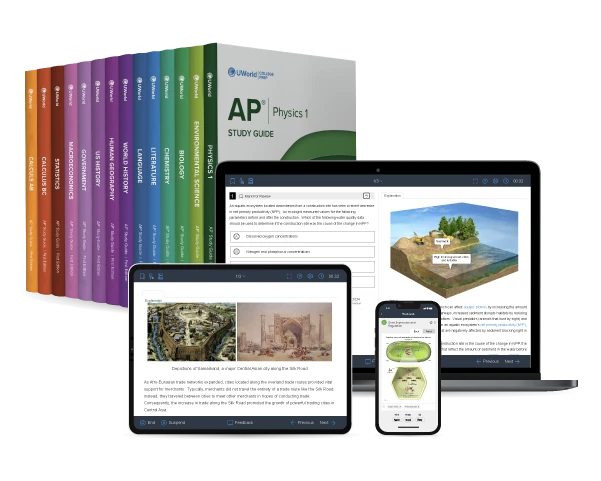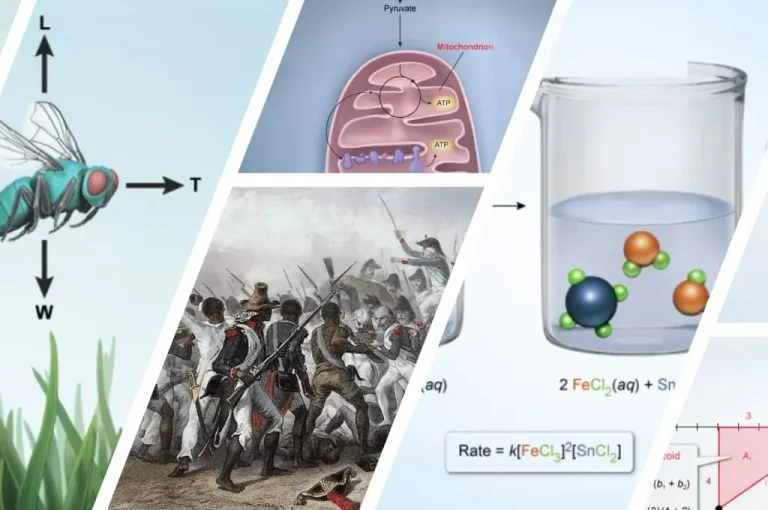Advanced Placement® (AP) courses are college-level classes offered in high school, typically taken during the junior or senior year. Each course ends with a standardized exam, scored by College Board® on a scale of 1 to 5. Many U.S. colleges offer placement and/or credit for scores of 3 or higher.
What Is an AP Class?
AP classes provide high school students with in-depth content equivalent to entry-level college courses, helping them get ahead academically. These classes, which can last 1 semester or the whole school year, enhance writing, critical thinking, problem-solving, and cross-topic connections. Taking AP courses is recommended for students planning to attend college, as they can impress admissions committees and potentially save money on tuition.
How Many AP Courses Are There?
For the 2026-27 school year, there are 40 AP courses1 across 7 primary disciplines. The availability of courses varies by school, so check with your AP coordinator or counselor to see which ones are offered at your high school. Here are the 7 disciplines with available AP courses:
-
AP Capstone Diploma Program: This is a 2-year program based on 2 AP courses:
- AP Seminar
- AP Research
-
Arts: Under the Arts umbrella, there are 3 AP courses:
- AP Art History
- AP Art Design and Program — AP Studio Art: 2-D Design, 3-D Design, Drawing
- AP Music Theory
-
AP English: AP English is divided into 2 AP courses:
- AP English Language and Composition
- AP English Literature and Composition
-
History and Social Sciences: This discipline consists of 10 AP courses:
- AP Comparative Government and Politics
- AP European History
- AP Human Geography
- AP Macroeconomics
- AP Microeconomics
- AP Psychology
- AP U.S. Government and Politics
- AP U.S. History
- AP World History: Modern
- AP African American Studies
-
Math and Computer Science: The following AP courses are included in this category:
- AP Calculus AB
- AP Calculus BC
- AP Precalculus
- AP Computer Science A
- AP Computer Science Principles
- AP Statistics
-
Sciences: Under the AP Sciences, there are 7 AP courses:
- AP Biology*
- AP Chemistry*
- AP Environmental Science
- AP Physics 1: Algebra-Based*
- AP Physics 2: Algebra-Based*
- AP Physics C: Electricity and Magnetism*
- AP Physics C: Mechanics*
*These courses have a lab component. Save your lab notebooks and reports! Colleges may ask to see them before granting you credit.
- AP World Languages and Culture: Under AP World Languages and Culture, there are 8 AP courses:
- AP Chinese Language and Culture
- AP French Language and Culture
- AP German Language and Culture
- AP Italian Language and Culture
- AP Japanese Language and Culture
- AP Latin
- AP Spanish Language and Culture
- AP Spanish Literature and Culture
Top 10 Most Popular AP Courses
Several factors influence which AP courses are most commonly taken and why some are more popular. The following reasons help explain this popularity.
- Broad college credit applicability: Many colleges require AP courses, such as English Language and Composition, making them popular for securing graduation credits.
- Core and specialized credit: Courses such as AP Calculus AB and AP Chemistry allow students to bypass foundational college courses, useful for majors like physics or medicine.
- High school availability: Popular AP courses, such as AP Calculus AB and AP Chemistry, are commonly offered, making them more accessible.
- Difficulty reputation: Some AP courses are perceived as more difficult, leading students to avoid them in favor of “easier” courses for securing credits.
Number of 2025 Test Takers by AP Course
The following courses have been consistently preferred by test takers year after year. Based on the number of test takers in 20252, this list compiles the most popular AP courses:
Why Take AP Classes?
AP courses offer the opportunity to explore subjects in-depth, preparing you for college-level work. They enhance creativity, build confidence, and teach essential time management and study skills. Here are 4 more key advantages of taking AP classes in high school:
- College readiness: AP courses are fast-paced and challenging, covering more material than standard high school classes. They help you build creativity, intellect, and research skills, easing your transition to college.
- Boost college applications: Scoring well on AP exams enhances your résumé and shows college readiness. It signals academic rigor, which positively impacts college admissions, with 85% of institutions reporting a favorable view of AP experience.
- Strengthen your high school transcript: AP courses can add extra weight to your GPA. Getting an A in an AP class boosts your GPA more than in a regular class, potentially helping you rank in the top 10% of your class.
- Save time and money: AP credits can allow you to skip introductory college courses, saving both time and tuition fees. This can potentially save you a year of college and one-quarter of your total tuition costs.
Ready for your AP exam? Start studying with UWorld’s comprehensive, interactive exam AP prep courses designed to help you master the material. Sign up for a free trial today and get ahead in your studies!
Can I Take an AP Exam Without Taking the Class?
It’s not mandatory to take an AP class to sit for the AP exam. While self-studying is an option, expert instructor guidance can be helpful as AP exams cover content beyond the standard high school curriculum. Online AP courses offer a convenient option for students who prefer to prepare from home.
When Should I Start Taking AP Classes?
Typically, students take AP classes in 11th grade after building foundational knowledge. However, some 9th and 10th graders may take AP classes, which is acceptable to College Board.
How Many AP Classes Should I Take?
The number of AP courses you take depends on your goals and the college you’re applying to. Generally, most students take 3 AP courses per year, aiming for a minimum score of 3 for college credit or placement.
- Ivy League schools (such as Princeton or Harvard) expect 8-12 AP courses, with a mix of core subjects and specialized courses.
- The Top 20 schools (such as Stanford and MIT) typically look for 6-10 AP courses, focusing on core subjects and related to your future goals.
- Selective colleges (Top 100) prefer 4-6 AP courses, often across core subjects.
- Less selective colleges usually look for 1-5 AP courses related to your major.
Let’s break it down in the following table:
| How many AP Classes are recommended for specific colleges? | |
|---|---|
| Ivy League Colleges | Minimum of 8 AP courses (5 core + 3 specialized) |
| Top 20 schools | Minimum of 6 AP courses (core + specialized) |
| Top 100 schools | Minimum of 4 AP courses |
| All other schools | Minimum of 1 AP course |
Choosing the Right AP Course
When choosing AP courses, focus on your passions and strengths to maximize success. Here are some tips:
- Balance core and specialty courses: Opt for a mix of foundational courses (e.g., English, Calculus AB) and specialized ones if you’re uncertain about your major.
- Check college credit/placement: Ensure your AP courses are accepted for credit or placement at your prospective college. Use College Board’s AP Credit Policy Search to guide your decision.
- Align with your major: If you have a specific field in mind, select AP courses related to it. For example, take AP Calculus BC or AP Physics for STEM majors, or AP Biology and Chemistry for careers in medicine or pharmacy.
- Research course content: Review AP course topics, talk to teachers and peers, and explore practice tests to ensure the course aligns with your interests and goals.
Here are 15 popular and core AP courses to help you understand their content and difficulty level. Some of these courses may be more challenging to score well in than others.
- AP English Language and Composition
The AP English Language course focuses on developing critical reading, writing, and persuasive skills. It prepares you for careers in copywriting, editing, translation, and journalism by teaching you to analyze non-fiction works and write essays with various goals, such as explaining, arguing, or persuading.
- AP English Literature and Composition
The AP English Literature course enhances your ability to analyze fiction, poetry, and theater from different periods and cultures. You’ll study classic literature and write essays to interpret and argue your analysis, preparing you for careers in English literature, film studies, or comparative literature.
- AP Human Geography
The AP Human Geography course explores population, migration, and land-use trends using geographic tools. You’ll learn to apply geographic concepts to real-world situations, analyze data in various formats, and understand spatial relationships. This course prepares you for careers in anthropology, civil engineering, environmental studies, and area studies.
- AP Psychology
The AP Psychology course explores the scientific study of behavior and mental processes. It teaches you to analyze research data and apply psychological concepts to real-life situations. It’s ideal for students interested in fields like anthropology, childcare, criminology, film studies, and psychology.
- AP U.S. History
The AP U.S. History course covers the cultural, economic, political, and social developments of the United States from 1491 to the present. It involves a detailed study of historical events, movements, laws, and dates. The curriculum is memory-based, focusing on understanding the chronology. This course is ideal for future curators, geographers, lawyers, or historians.
- AP World History: Modern
The AP World History: Modern course covers global cultural, economic, political, and social developments from 1200 CE to the present. It teaches you to analyze historical texts, visuals, and evidence to develop reasoning-based arguments. This course is ideal for careers in foreign service, history, political science, or law.
- AP Calculus AB
The AP Calculus AB course covers differential and integral calculus concepts, methods, and applications. It prepares students to solve problems using calculus and helps bypass core math courses in college. This course is essential for careers in engineering, physics, architecture, and other math-intensive fields.
- AP Calculus BC
The AP Calculus BC course covers differential and integral calculus, focusing on theory, problem-solving, and proper mathematical notation. It prepares students for careers in finance, education, aerospace engineering, and mathematics.
- AP Statistics
The AP Statistics course teaches statistical methods to analyze and interpret data, focusing on calculating probabilities and identifying patterns. It prepares students for fields like engineering, actuarial science, economics, and criminology.
- AP Biology
The AP Biology course covers key scientific concepts, theories, and processes related to biological systems, with hands-on lab work. Students will design experiments, analyze data, and draw conclusions. It’s ideal for those pursuing careers in medicine, pharmacy, biochemistry, or biomedical engineering.
- AP Chemistry
The AP Chemistry course covers key concepts like structure, states of matter, intermolecular forces, and reactions. It teaches you to test hypotheses, balance chemical equations, and understand complex chemical processes. Ideal for those pursuing careers in atomic science, biochemistry, or chemical engineering, this course is essential for those interested in chemical structures and reactions.
- AP Environmental Science
The AP Environmental Science exam measures your understanding of ideas, theories, concepts, and problems arising from human interaction and the environment. The course will teach you how to evaluate the risks associated with these issues and the advantages of potential alternatives.
- AP Physics
The AP Physics course covers fundamental concepts like Newtonian physics, work and energy, momentum, rotational motion, and simple harmonic motion. It also teaches you to apply algebra to problems in Newtonian mechanics and energy. You’ll gain hands-on lab experience, making this course a solid foundation for meteorology, astronomy, or mathematics careers.
- AP United States Government and Politics
This course requires students to describe, analyze, and compare U.S. political concepts, apply legislative decisions to real-world situations, and assess their consequences. It’s ideal for those pursuing law, African American studies, or journalism careers.
- AP Macroeconomics
AP Macroeconomics explores economic principles that apply to the economy as a whole, including inflation, unemployment, and monetary policy. Students learn to analyze economic data and evaluate government policies. It’s a strong fit for those interested in business, finance, or public policy careers.
Before selecting the AP subjects, consider your interests, future goals, and career aspirations. Think of it as building a foundation to ensure you’re committed to your future career path!

Frequently Asked Questions (FAQs)
How do I get into AP classes?
To take AP classes, follow a few easy steps:
- Choose the AP courses you wish to take, and check with your high school’s website for the offered courses.
- Once you finalize your list of AP courses, reach out to your high school counselor or AP coordinator.
- They will help you with the sign-up process and inform you of any prerequisite high school courses required for your chosen AP course.
Can you take AP classes during the summer?
How do I take AP classes outside of school?
Do AP classes have midterms?
Can you switch out of an AP class?
When do AP courses begin?
How do I take an AP course online?
Can you take AP courses in homeschool?
Should I take AP classes in 9th grade?
How many credits do you get for an AP class?
Learn More About Specific AP Courses and Exam Information
| AP Sciences | AP English | AP History & Social Science | AP Math |
|---|---|---|---|
| AP Biology | AP English Language | AP Human Geography | AP Calculus AB |
| AP Chemistry | AP English Literature | AP Psychology | AP Calculus BC |
| AP Environmental Science | AP U.S. Government | AP Statistics | |
| AP Physics 1 | AP U.S. History | ||
| AP World History: Modern | |||
| AP Macroeconomics |
References
- How Many AP Courses Are There? (2025). College Board. Retrieved from https://blog.collegeboard.org/how-many-ap-courses-are-there
- 2025 AP Score Distributions. (2025). apstudents.collegeboard.org. Retrieved from https://apstudents.collegeboard.org/about-ap-scores/score-distributions





